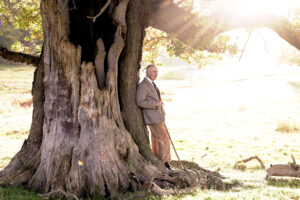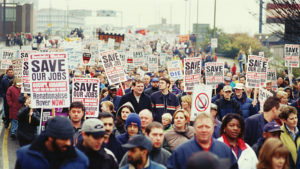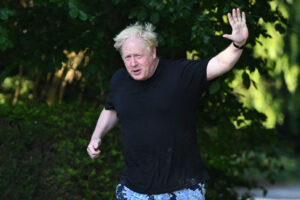It’s 1pm, and the mercury is kissing 30°C when the first pipers round the bend. Four abreast, they march: drums beating, bagpipes pumping in the heat. Thousands of people line the pavement, pushed up against the verge, clasping warm pints of lager as they watch. I can feel my neck burning.
After the pipers comes a succession of American cop cars. One is from Los Angeles; another is playing KRS-One’s “Sound of Da Police”. Next are the floats, soliciting charitable donations, and then the local worthies. The scouts, a youth farming group, naval cadets, and a topless child manning a machine gun mounted on a truck are all present.
This is Nuneaton Carnival, an annual fair launched in 1930 to raise money for the local hospital that has been a fixture ever since. Today, following a four-year Covid-enforced break, the market town is out to party. It is Middle England as conjured by the fever dreams of Paul Dacre, a provincial part of Warwickshire where one might once have spotted old maids cycling to communion through the morning mist.
If Nuneaton lives at all in the public imagination today, it is as the place where George Eliot was born and Ed Miliband died. In 2015, it was viewed as the ultimate bellwether constituency: had Miliband won Nuneaton he would have been prime minister. But it wasn’t to be. David Cameron would later crow it was at 1.53am, when the town declared, that he knew he had won the general election outright.
Being 37th on Labour’s list of targets, the Warwickshire market town ought to have flipped that night. Other than at Thatcher’s pomp, in 1983 and 1987, the constituency had been red from 1930 to 2010. Brexity, deprived, struggling with the cost-of-living crisis and convinced that immigration is too high, it is the exact type of seat that Sir Keir Starmer is straining to win at next year’s general election. Since 2010, it has been held by Marcus Jones, a stolid Midlands solicitor who has lived in Nuneaton all his life, and whose lead over his Labour rival yawned to a 30-point gap at the last election.
Arriving at the town by train, the first sight is of Hell. On platform 1, a mural — about eight feet high and 20ft across — seems to depict the town alight: long tongues of flame wrap themselves around buildings, bridges and trees, consuming all. This Guernica of the West Midlands — On the Right Tracks by Joanne Bannister — was commissioned by Nuneaton & Bedworth In Bloom. I try to find someone to ask about it, but the ticket office is shut, and no staff can be found.
Across town in Gala Field, rows of gazebos mark the spot where the carnival procession is to begin and end. Amid the food trucks and tombola stalls, I meet Martin Parrack, who has pitched up to run a PR drive on behalf of the Warwickshire Freemasons.
“I’m here to dispel the myth that we’re in the Illuminati,” he tells me in a flat Brummie accent. “The principles of the Masons are to be good to your neighbours and your family.” Between the secret handshakes and cloak-and-dagger ceremonies, I suggest, you must talk to a lot of different people. How do you think the town is doing right now?
“The membership of the Masonic temple in Nuneaton is growing,” he says. “Young people who can’t afford to buy houses in Coventry or Birmingham are moving to the town. They’re moving to areas that wouldn’t have been so… desirable in the past.”
But the region, he adds, is not in a good place. “Tamworth is struggling, Nuneaton is the same. I recently walked from Birmingham to Nuneaton, then from Nuneaton to Atherstone, to raise money for charity. If you walk through Nuneaton town centre, you can see a marked decline in footfall. Today is a Sunday, but that was midweek. It’s not vibrant.”
A few stalls down, two local women soliciting donations for a disability charity share much the same story. “We’re still at the tail end of Covid, feeling its after-effects,” the younger woman, who is in charge, tells me. “Society has changed. People are less sociable. The community spirit has petered out a bit.”
Her older colleague chimes in. “Covid was the final nail in the coffin,” she says. “The high street is declining. People are counting their pennies.”
Nuneaton has been on a slow decline for some time. Once an epicentre of the Industrial Revolution, the flat land around here was pockmarked with coal mines sunk deep into the earth. Just a decade ago, the Daw Mill colliery — just a 20-minute drive away — was one of the largest in Europe still operating.
Then, in February 2013, a fire broke out 740 metres below ground. Sparked seemingly from nothing, it spread quickly to a ventilation unit and 100 miners had to be evacuated. Fourteen stayed behind to contain the blaze, but to no avail. A few years earlier, employees had been making £70,000 a year, with dozens chasing every vacancy. Now, out of nowhere, the mine was forced to close; 650 men lost their jobs.
Today, at Nuneaton Museum, a small exhibition featuring a spread of historical curios are all that remains of the industry. A woman working behind the desk tells me the closure of the pits was a blow to the town.
“We ran an event where we invited people in to discuss their memories of mining,” she says. “There is definitely a big sense of sadness at the loss of the industry. There was a fondness for coal. It was a real part of the town. It was in the bones of Nuneaton.” Can the area be revived? “There are a lot of plans in place to regenerate the town and to bring it out of what’s perceived as a slump,” she insists.
As for who they’ll vote for, she says locals are “sick” of the Tories. “The choice to vote for the Conservatives was made in desperation,” she explains. “Labour used to be popular, but there was a loss of faith in the party.”
Lianne Parry, a volunteer busy talking to the few guests who wander in, agrees that Starmer could win the seat. “The faith in Labour could come back,” she claims. Nuneatonians voted for Brexit, but they didn’t understand what it was or what it would do. “After it happened, they wondered why things were so difficult, but they voted for it without asking questions.”
I walk from the museum up into town, towards the high street. When the 18th-century non-conformist historian William Hutton visited Nuneaton, he described it as being “in the domain of sleep”. Some 250 years later, little has changed. Nuneaton Beds and Sofas is having a closing-down sale; the Myton Hospice a clearance sale; Debenhams is boarded up; a sign in the window of Gattsbys solid oak furniture specialists declares: “Sorry — closed.” The high street is largely deserted. The first man I try to talk to rides away at speed on his mobility scooter, insisting he does not live in Nuneaton.
I stop in at Lord Hop, a microbrewery set up in a shop that was once a former beauty salon. Its landlord, who was born in Nuneaton but now lives outside, says the footfall is so low, he often closes at 7pm during the week. Despite that, he insists, “the town is coming back”, with a new cinema and restaurant set to open. “It’s natural to be optimistic,” he tells me. “We never fully recovered from Covid. Covid chucked everything out of sync.”
In response, the Government “chucked money at the town”, he adds — but the £4 million from the levelling-up fund was not enough. It failed to tackle the real causes of decline — inchoate talk of council “corruption” and big business getting away with something, as well as a broader sense that the area hasn’t taken advantage of Brexit. Online, equally vague rumours about municipal corruption have been raised, with little substance behind them. “Where is all the money going?” ask Nuneaton and Bedworth Community Association on a website that also features a video suggesting the World Economic Forum “runs the world”.
The first crack in Labour’s local base of power came in 2008, when the Conservatives took control of the borough council for the first time since it was established in 1974. The “last fortress of socialism in Warwickshire” had fallen, the Coventry Telegraph reported. On a flying visit to the town, David Cameron congratulated then councillor Marcus Jones, the future agent of Miliband’s doom.
Could Jeremy Corbyn do any better? It was at a Labour leadership hustings in Nuneaton, after all, that the oddball backbencher drew such great applause that both Owen Jones and Toby Young foresaw his eventual victory. Held just a month after Miliband failed to win over the town, the occasion was designed to excise the spirits of defeat, but — as if the party’s new leadership had been built upon a burial ground — it would only come back to haunt them. In 2019, the Tory margin of victory stretched to 13,000.
“They’re all the same, all the politicians are the same,” says Nick, a regular nursing a pint of porter. “Corbyn was very Left-wing. He wasn’t interested in improving the town, he was interested in his own agenda. He believed in God knows what.” Nor was Corbyn strong enough, says the landlord — not strong enough to take on the capitalists, not strong enough to reverse decline, not strong enough to represent them.
Starmer, meanwhile, is too posh and too remote. Bill Olner, the Labour MP who represented Nuneaton from 1992 until 2010, was different, they say. Nick adds: “He mixed with the locals. He was a working man all his life until he was elected to parliament.” After his defeat, Olner, a former electrician and union shop steward, joined the local council and served until he contracted Covid and died in the local hospital.
Yet if it was Nuneaton where Labour’s crack-up began, and Nuneaton where their entry into the wilderness was confirmed, it may yet be the origin of their revival. A recently watered-down green energy plan from the party would mean investment for a new electric battery factory in the region. Locals remain confident things can change, while sceptical of the ability of politicians to help. Or, as Harry Ghale, one of the town’s many retired gurkhas told me as he helped set up a community barbecue: “Nuneaton is okay. I’m not bothered about who wins the next election.”
Disclaimer
Some of the posts we share are controversial and we do not necessarily agree with them in the whole extend. Sometimes we agree with the content or part of it but we do not agree with the narration or language. Nevertheless we find them somehow interesting, valuable and/or informative or we share them, because we strongly believe in freedom of speech, free press and journalism. We strongly encourage you to have a critical approach to all the content, do your own research and analysis to build your own opinion.
We would be glad to have your feedback.
Source: UnHerd Read the original article here: https://unherd.com/




